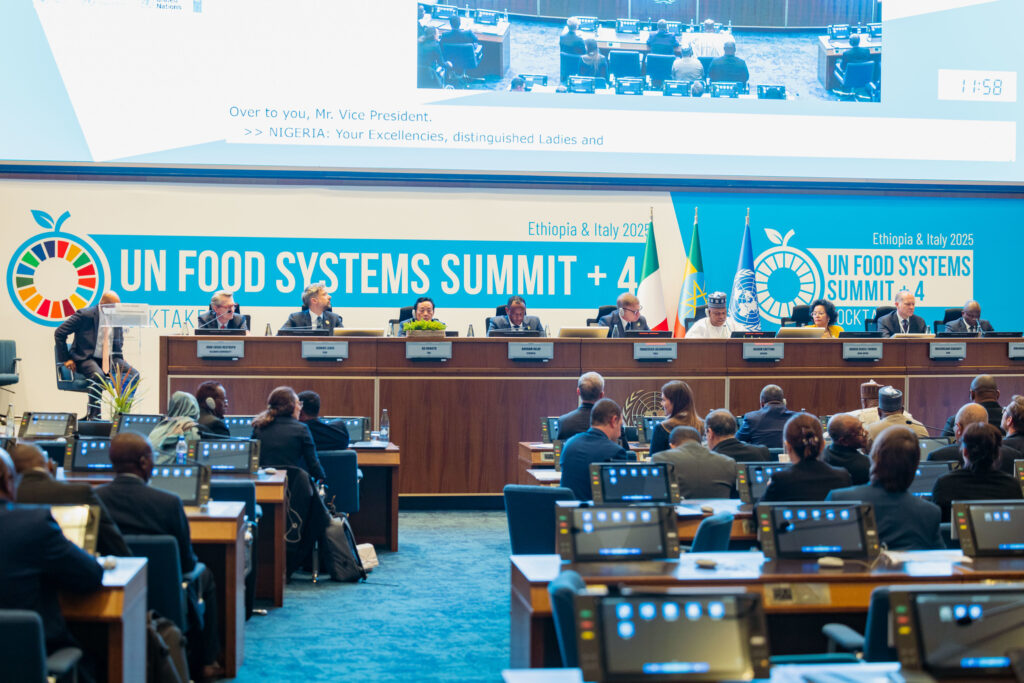
Nutrition at the Crossroads: Insights from N4G and UNFSS
31 July 2025Over the past four months, I have had the opportunity to attend two major global gatherings that are shaping the future of nutrition and food systems: the Nutrition for Growth (N4G) Summit and the UN Food Systems Stocktaking Moment (UNFSS+4). These events brought together governments, civil society, the private sector, and international organizations — all united by a shared goal: to accelerate progress toward healthier, more sustainable food systems.
As I reflect on both summits, I am struck by the momentum we are building, the challenges we still face, and the critical importance of staying focused on impact. How will these summits help create food systems that guarantee universal access to healthy and sustainable diets – enabling people to live full and productive lives?
Nutrition for Growth (N4G): A rabbit pulled out of a hat
Let’s start with N4G. Making this summit happen was a major achievement, and it delivered on many fronts amidst ODA funding cuts and a challenging geopolitical climate. Most notably, it mobilized an impressive $29.5 billion in commitments — a clear signal that nutrition is finally being recognized as a foundational investment in human and planetary health.
What made N4G stand out was its vision and the drive to bring commitments to the table. There was a strong emphasis on accountability, and multi-sectoral collaboration. These priorities weren’t just buzzwords; they were embedded in the pledges made and discussions throughout the summit. The Global Nutrition Report’s Nutrition Accountability Framework (GNR NAF) allows us to track commitments and collect data on progress.
The final statement from N4G, within the context of the Sustainable Development Goals (SDGs) signals a clear direction of travel. We have the tools, the frameworks, and now, significant financial and policy commitments. The challenge is turning these into measurable impact.
UNFSS+4: Energy, Engagement, and Emerging Priorities
The UN Food Systems Stocktaking Moment, four years after the first food systems summit, offered a moment of reflection on progress. Ministers and Presidents from around the world came together to share the progress their countries have made, demonstrating evident political will. Details are documented in the progress report. Now, more than ever, there is a need for consolidated data on what’s working, what’s not, and where we need to course-correct.

The energy in the room was undeniable. The sheer number of attendees made it clear: people are eager to meet in person, to brainstorm, and to collaborate. There is a real hunger (pun intended) for connection and co-creation — something that can’t be replicated behind a laptop screen.
One of the most encouraging shifts was the increased visibility of nutrition. Compared to the UNFSS+2, nutrition was brought up in multiple sessions. It wasn’t just a side topic — it was woven into discussions on agriculture, finance, equity, and resilience.
Yet despite shared intentions, connection between N4G and UNFSS was missing. These summits are deeply interconnected — both aspiring to transform food systems and improve nutrition outcomes — yet the overall messaging did not reflect that synergy. A missed opportunity, perhaps, to reinforce the narrative that nutrition is a priority outcome of the food systems.
Financing was a major theme across both summits, even more so at UNFSS+4. From public and private finance to blended finance and derisking investments, there was a clear push to make nutrition funding more strategic and impactful. Tools like IFAD’s 3FS, which helps track financial flows, are promising innovations that can bring more transparency and efficiency to the space.


The role of the private sector was also a hot topic — and rightly so. Businesses have a crucial role to play in transforming food systems, but the question is how to do this constructively and accountably.
Corporate accountability is a complex and often contentious issue. That’s why I was proud to see ATNi represented in a dedicated session on this topic. Our board member Susanne Stormer shared some powerful insights:
“Companies are part of complex systems where their success is deeply tied to employees, communities, and the planet. If we want to build sustainable, resilient food systems, we must help leaders shift their perspective — and see their role in the bigger picture.”
Moreover, Wampie Libon, Director of Inclusive Green Growth and Ambassador of Sustainable Development, Ministry of Foreign Affairs Netherlands quoted ATNi in her intervention, stating that organizations like ATNi produce valuable data necessary to track progress of the private sector.
Just as businesses have embraced environmental disclosure standards — from GRI to CDP, ISSB to CSRD — we now need similarly strong norms and metrics for nutrition and food system accountability. ATNi is working hard on this topic – FTSE Russell, ISS, S&P Global CSA, and ISSB now use our indicators and data in their ratings or are piloting them for scale up.
Aligning these efforts will help ensure nutrition accountability is mainstreamed across all sectors, rather than treated as a standalone issue.
The Road Ahead: A Decade of Action for Nutrition
We are at a critical juncture. This is the decade of action for nutrition, and we cannot afford to lose momentum. Healthy diets must be at the heart of food systems transformation — not just as a health imperative, but as a driver of economic, social, and environmental progress.
At ATNi, our key messages remain clear:
- Better accountability leads to better data — and better decisions.
- We need multi-stakeholder dialogues where civil society, governments, UN agencies, and the private sector come together to co-create solutions.
- Nutrition-sensitive financial flows must be scaled and monitored to ensure that resources reach the areas of greatest need, while also introducing innovative approaches to leverage public and private funding for greater impact.
As we look ahead, the calendar is packed with critical events for the nutrition world. These summits were just the beginning. The real work happens in the months and years to come — in boardrooms, ministries, communities, and farms, bringing the commitments from paper to practice.
Let’s keep the dialogue going. Let’s aim for impact. And let’s make sure that nutrition stays at the heart of the food systems transformation we all want to see.

